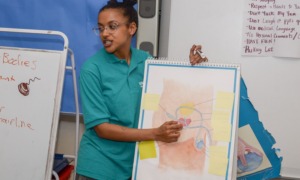 In the past several decades, the United States has seen a significant drop in the adolescent pregnancy rate: from 116.9 pregnancies per 1,000 adolescent girls in 1991 to 57.4 in 2010. Several factors have contributed to this decline, including a decrease in the number of teens having sex and an increase in the age at which young people first have sex. But the strongest single factor affecting the decline in teen pregnancy has been the increased use of contraception.
In the past several decades, the United States has seen a significant drop in the adolescent pregnancy rate: from 116.9 pregnancies per 1,000 adolescent girls in 1991 to 57.4 in 2010. Several factors have contributed to this decline, including a decrease in the number of teens having sex and an increase in the age at which young people first have sex. But the strongest single factor affecting the decline in teen pregnancy has been the increased use of contraception.
A lower adolescent pregnancy rate is vital to the well-being of today’s adolescents and their eventual children. Today, even with the decline, America’s teen pregnancy rates still remain higher than those of other developed countries, and if current non-marital birth rates continue, we can expect that teens will continue to have 40 percent of their births outside of marriage.
We know the majority of adolescent sexual activity occurs within the context of a relationship. Despite this, comprehensive sex education programs are often more focused on the “body” aspect of sex and not the “heart and brain” of sexual relationships. Healthy relationship curricula for youth-focused programs can enhance sex education programs, as well as improve current and future family-related outcomes.
But many pregnancy prevention programs understandably continue to focus on the potentially life-altering negative outcomes from adolescent relationships. This singular focus often can overshadow the many positive aspects of teenage romantic relationships.
In the book, “The Role of Romantic Relationships in Adolescent Development,” some of its contributors suggest that adolescent friendships and romantic relationships provide an opportunity for self-exploration and allow young people to learn healthy relationship patterns that are developmentally appropriate. Learning relationship and communication skills can positively impact a young person’s quality as a partner and expectations of how spouses and marriages should operate in adulthood. Establishing healthy relationship patterns during the teenage years can improve the quality of later marriages and the well-being of the children raised within those marriages.
Healthy relationship programs offer opportunities to address the nonsexual components of adolescent relationships and complement many of the lessons in comprehensive sex education classes. Generally, these programs teach young people how to effectively communicate their needs and thoughts, negotiate differences and deal with conflict safely, determine their current and future relationship goals, and deepen their values and beliefs around family, partnerships and children. Healthy relationship curricula also describe the warning signs of potentially unhealthy or unsafe dating relationships and describe each partner’s rights and responsibilities around respecting each other.
All these lessons amplify and expand upon those typically introduced in sex education classes. For example, many of those curricula stress consent and contraceptive negotiation skills. Relationship education deepens that discussion by giving adolescents tools to communicate and to express themselves in a way that builds intimacy and strengthens friendships. Such tools can be used to make decisions about the physical nature of a relationship and, if mutually chosen, when and with what protection to become sexually active.
Since 2005, the U.S. Department of Health and Human Services’ Office of Family Assistance has provided grant funding to organizations across the United States to deliver youth-focused relationship education. During any given year, more than a dozen grantees provide healthy relationship education to more than 6,000 participants ages 14 to 22. These programs use a variety of curricula, including the “Art of Loving Well,” “Love Notes,” “Active Relationships for Young Adults” and “Connections.”
Many participants receive healthy relationship education through their school system, but other programs work through after-school programs, faith-based institutions, community organizations or even juvenile detention centers. Healthy relationship programs are also offered to young people with a variety of needs or in different life stages, including parenting adolescents, teens who have dropped out of school and teens with juvenile justice experience.
One such program is RealTalk, offered by the Future Foundation, a nonprofit organization in the Atlanta area. With a focus on reducing the intergenerational transfer of poverty and inequality, Future Foundation provided the RealTalk program to more than 1,200 youth and their parents during the 2013-14 school year. The program provides 20 hours of the Dibble Institute’s “Connections” curriculum, an evidence-based, youth-focused program that addresses issues of love, sex, dating, relationships, budgeting, substance use, college readiness and sexually transmitted diseases/infections, along with enrichment activities, domestic violence awareness, special events and public awareness campaigns.
RealTalk targets adolescents in grades nine through 12 and is delivered primarily in schools through health classes. As Future Foundation’s website states, “Each person has the power to make the right choices for themselves and their bodies, and to develop healthy, respectful relationships with their peers. We make sure our students understand that.”
The RealTalk program also connects with the parents of the young people they serve. By educating parents about adolescent relationships, healthy communication and conflict resolution using the Ready for Love curriculum, RealTalk offers parents and their kids the same language to talk about relationships — and to interact with each other. Parents also participate in a youth-focused parent education curriculum called the Parenting Skills Program, designed to build parental empathy, change youth behavior and build parent-youth communication.
RealTalk has demonstrated effects. According to program director Eddrena Clark, as a result of RealTalk program completion, 81 percent of youth participants can identify the signs of teen dating violence and 77 percent improve their relationship skills.
Healthy relationship education is a strengths-based approach to helping young people learn how to navigate, evaluate and engage in romantic relationships across all aspects of human connection. By adding such programming to more traditional offerings of sex education, schools, youth-focused organizations and other stakeholders can ensure that adolescents will avoid negative sexual outcomes like pregnancy or sexually transmitted infections (STIs). Young people will also get to experience the joy, comfort and growth that occurs in a healthy, developmentally appropriate dating relationship.
Allison Hyra is a fellow at ICF International where she translates research and evaluation findings into actionable advice and support to help human service professionals improve their services to America’s children, adolescents, families and communities. Matthew Shepherd, Ph.D., is a community/clinical psychologist and expert consultant for ICF International who has worked with Healthy Marriage/Relationship Education programs for nearly a decade.



























